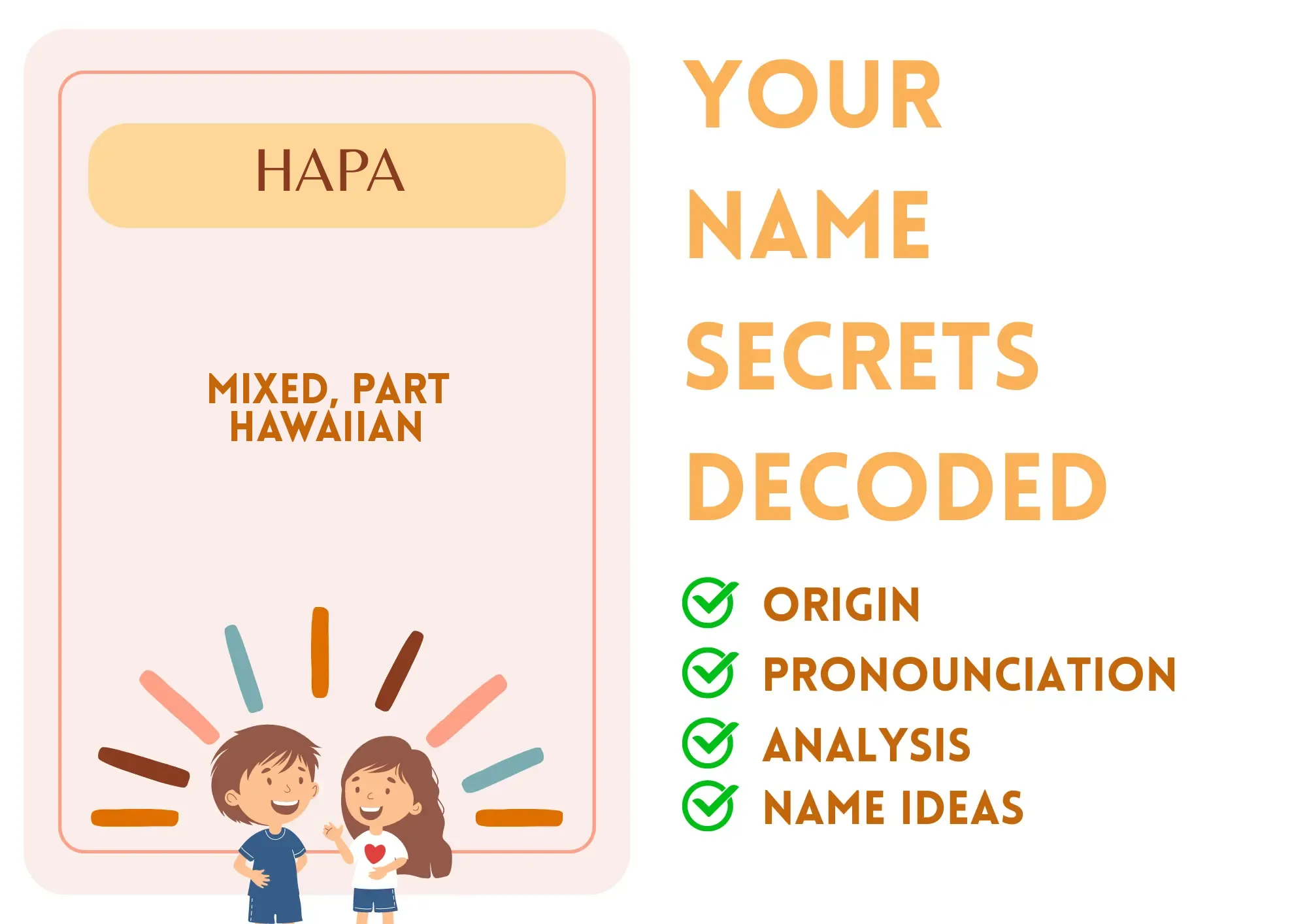
Hapa
Hapa is a unique name with Hawaiian origins that carries the meaning of 'mixed' or 'part', often referencing a blend of ethnic or cultural backgrounds. It is predominantly used as a gender-neutral name, though it can be seen as leaning toward a more masculine tone. Hapa is commonly embraced within Hawaiian culture and is often used to celebrate multicultural identities, especially within the context of those of Asian and Pacific Islander descent. The name champions inclusivity and the richness that comes from diversity.
Perceived positively, Hapa evokes feelings of connection to heritage and promotes the idea of unity among different cultures. It is easy to write and pronounce, with a casual, rhythmic flow. Common nicknames include Hap and Pa.
In popular culture, while the name Hapa may not be featured as prominently in mainstream media, it has been used in various artistic expressions highlighting multiculturalism and identity. It is cherished for its meaningful representation of blended heritages and is increasingly popular among parents looking for names that reflect the modern, interconnected world.
Basic Information
Gender: Unisex
Sounds Like: HAH-pah
Pronunciation Explanation: The first syllable is pronounced like 'ha,' and the second syllable has a softer sound, like 'pah.'
Summary and Meaning
Meaning: mixed, part (Hawaiian)
Origin: Hapa has origins in Hawaii, used within a context that celebrates multicultural backgrounds.
Usage: Hapa is primarily a unisex name, suitable for any gender.
Name Number (Chaldean)
Name Number (Pythagorean)
Popularity (Global Rank)
Overall: 289989
Boys: 72681
Girls:
Most Popular in
Religious and Cultural Significance
Religion: Hawaiian
Background: In Hawaiian culture, Hapa is embraced as a term to describe individuals of mixed ethnicity, reflecting the island's diverse heritage.
Cultural Significance: The name Hapa is commonly used to promote and celebrate the beauty of diversity and inclusion in multiculturalism, resonating strongly with those who identify with such backgrounds.
Historical Significance: Hapa has historical importance in Hawaiian society as it acknowledges the intermingling of cultures, especially during the period of colonization and the subsequent blending of Hawaiian and other Pacific Island cultures.
Popular Culture
Literature and Mythology: While not a character name prominent in literature, Hapa is referenced in discussions and narratives focused on multicultural experiences.
Movies and Television: The term often comes up in documentaries and media focusing on Hawaiian culture and the lives of biracial or multicultural individuals.
Feelings and Perceptions
Perception: Hapa is generally viewed positively, often associated with unity, diversity, and the celebration of mixed heritage. It carries a sense of pride for many families.
Positive Feelings: Inclusive, diverse, cultural, rich, proud.
Negative Feelings: Some may find it unfamiliar or difficult to associate with a specific gender.
Practical Considerations
Ease of Writing and Calling: Hapa is easy to write and pronounce, consisting of four letters and two syllables, making it simple to remember and say.
Common Typos and Misspellings: Hapaah,Hapae,Haapa,Happah
Common Nicknames: Hap,Pa
Hapa Popularity
Hapa Usage and Popularity By Country
| Country | Rank (Overall) |
|---|---|
| Egypt | 20205 |
| Romania | 23595 |
| Turkey | 28343 |
| Australia | 68209 |
| Mexico | 78583 |
| Germany | 81441 |
| Philippines | 100268 |
| United States | 135477 |
| United Kingdom | 182431 |
Hapa Usage and Popularity By City
| City | Rank (Overall) |
|---|
Compatibility Analysis
Famous Persons Named Hapa
No results found for Hapa.
Related Names
Similar Sounding Names:
Hani,Hara,Hada,Hala